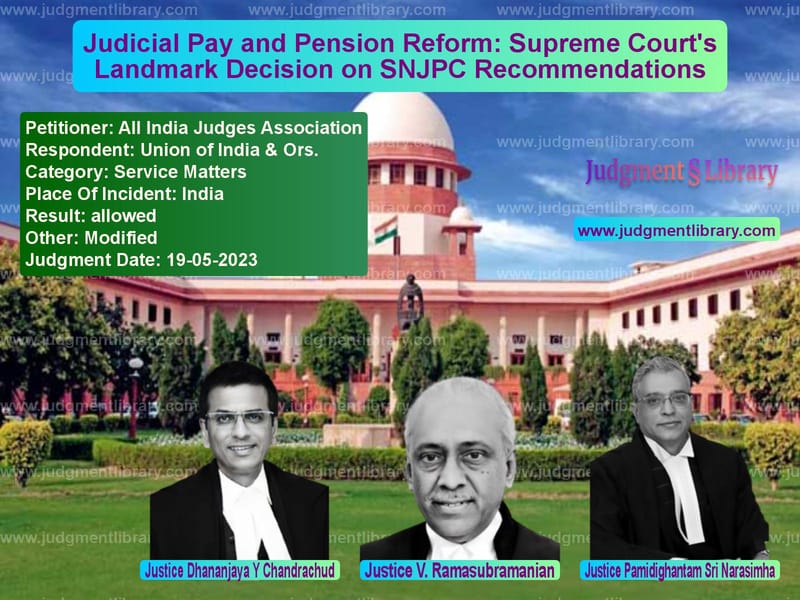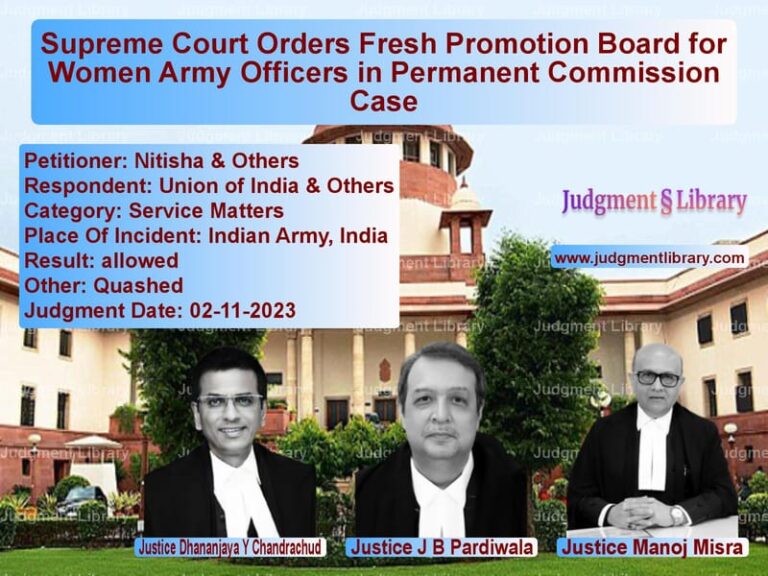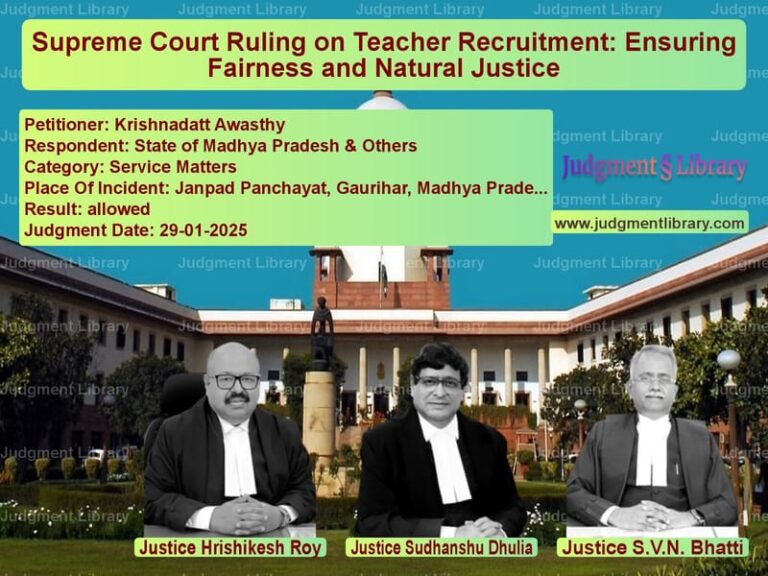Judicial Pay and Pension Reform: Supreme Court’s Landmark Decision on SNJPC Recommendations
The Supreme Court of India, in a landmark judgment in All India Judges Association vs. Union of India, addressed crucial aspects of judicial pay, pension, and service conditions. This case, filed as a writ petition by the All India Judges Association, sought to ensure the financial security and independence of the district judiciary by revising their salary structure, pension benefits, and service conditions. The Court upheld the recommendations of the Second National Judicial Pay Commission (SNJPC) and directed the implementation of revised pay scales, pension reforms, and allowances.
Background of the Case
The issue of judicial pay scales has been a long-standing concern in India. The Supreme Court had previously established the need for a separate judicial pay commission to maintain the independence of the judiciary. Following the First National Judicial Pay Commission (FNJPC) in 1996, which set the framework for judicial salaries, the SNJPC was appointed in 2017 to recommend further revisions in light of economic changes.
The key concerns raised by the petitioners were:
- Ensuring fair compensation for judicial officers to maintain their financial independence.
- Bringing uniformity in pay structures across different states.
- Revising pension benefits for retired judges and their families.
- Addressing stagnation in promotions and career progression.
- Preventing undue control of the executive over judicial finances.
Arguments Presented Before the Court
Petitioners’ Arguments
The All India Judges Association and senior advocates representing judicial officers made the following arguments:
- The pay of judicial officers must be independent of the executive branch to preserve judicial impartiality.
- The principles of separation of powers and financial security for judges are fundamental to upholding the rule of law.
- The delay in implementing pay revisions since 2006 had created financial hardships for judicial officers.
- The recommendations of the SNJPC must be adopted in full, ensuring uniformity across states.
- The pension structure must reflect fair treatment for retired judicial officers, including a multiplier-based revision.
Respondents’ Arguments
The Union of India and several state governments opposed the recommendations on various grounds:
- The financial burden of implementing SNJPC recommendations was too high for the states.
- The multiplier of 2.81 used to calculate revised salaries was deemed excessive.
- The proposal to increase pension benefits would create disparities with other civil service pension schemes.
- Increasing the number of selection-grade district judges would impact the administrative structure.
Supreme Court’s Observations
Independence of the Judiciary
The Supreme Court reaffirmed that the independence of the judiciary is part of the basic structure of the Constitution. The Court emphasized that financial security is a critical component of judicial independence and ruled that pay and pension revisions were necessary to maintain the dignity of judicial officers.
Pay Structure and Multipliers
The Court examined the SNJPC’s recommendations and found that applying a 2.81 multiplier to existing salaries was reasonable. It held that judicial officers perform sovereign functions and should not be compared to administrative officers when determining salary scales.
Pension and Gratuity Benefits
The Court ruled that pension revisions must apply to all retired judicial officers and accepted the SNJPC’s recommendation that pensions be calculated as 50% of the last drawn pay. It directed that family pension be paid at 30% of the last drawn salary.
Promotions and Career Progression
The Court ordered an increase in the percentage of selection-grade district judges from 25% to 35% and super-time scale district judges from 10% to 15% to ensure better career progression.
Final Judgment
The Supreme Court issued the following directives:
- The revised pay structure and pension benefits shall be effective from 1st January 2016.
- All arrears must be paid in installments, with full payment to be completed by 31st December 2023.
- The new pension scheme for judicial officers shall not be applicable, and the old pension scheme will continue.
- State governments must amend their rules to align with the revised pay scales.
- Additional increments must be provided for judicial officers facing delays in career progression.
Key Takeaways
- Judicial Independence: The ruling strengthens the financial independence of the judiciary.
- Uniform Pay Structure: Ensures consistency in salaries across states.
- Fair Pension Scheme: Provides better financial security for retired judicial officers.
- Promotion Reforms: Prevents stagnation in career growth for district judges.
- Executive Control Reduced: Affirms that the judiciary should have autonomy in financial matters.
Conclusion
The Supreme Court’s decision marks a significant milestone in ensuring the dignity and financial independence of the judiciary. By implementing the SNJPC recommendations, the Court has reaffirmed its commitment to judicial reforms and the constitutional principles of separation of powers and access to justice.
Petitioner Name: All India Judges Association.Respondent Name: Union of India & Ors..Judgment By: Justice Dhananjaya Y Chandrachud, Justice V. Ramasubramanian, Justice Pamidighantam Sri Narasimha.Place Of Incident: India.Judgment Date: 19-05-2023.
Don’t miss out on the full details! Download the complete judgment in PDF format below and gain valuable insights instantly!
Download Judgment: all-india-judges-ass-vs-union-of-india-&-ors-supreme-court-of-india-judgment-dated-19-05-2023.pdf
Directly Download Judgment: Directly download this Judgment
See all petitions in Pension and Gratuity
See all petitions in Recruitment Policies
See all petitions in Public Sector Employees
See all petitions in Employment Disputes
See all petitions in Judgment by Dhananjaya Y Chandrachud
See all petitions in Judgment by V. Ramasubramanian
See all petitions in Judgment by P.S. Narasimha
See all petitions in allowed
See all petitions in Modified
See all petitions in supreme court of India judgments May 2023
See all petitions in 2023 judgments
See all posts in Service Matters Category
See all allowed petitions in Service Matters Category
See all Dismissed petitions in Service Matters Category
See all partially allowed petitions in Service Matters Category







